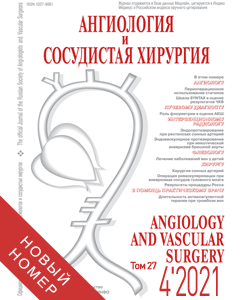Journal «Angiology and Vascular Surgery» •
2014 • VOLUME 20 • №2
Possibilities of endovascular surgery in treatment of acute arterial impairment of mesenteric blood circulation
Khripun A.I.1, Salikov A.V.1, Shuryguin S.N.1,2, Mironkov A.B.1,2, Pryamikov A.D.1,2
1) Chair of Surgery and Endoscopy of the Advanced Medical Training Department of the Russian National Research Medical University named after N.I. Pirogov,
2) Municipal Clinical Hospital No 12, Moscow, Russia
The authors demonstrate herein their experience (3 clinical case reports) in endovascular interventions in the basin of the superior mesenteric artery, performed for its thromboembolism (2 patients) and thrombosis (1 patient). Rheolytic thrombectomy from the superior mesenteric artery turned out inefficient in one patient and he was operated on in the scope of laparotomy, vast resection of the small intestine and the right half of the large intestine and indirect embolothrombectomy from the superior mesenteric artery. Aspiration thrombectomy had only a partial effect in the second patient presenting with thromboembolism of the proximal segment of the superior mesenteric artery: the major blood flow through the artery was restored and the scope of intestinal resection was reduced to 20 cm of the jejunum. Finally, the third patient underwent combined endovascular (rheolytic and aspiration) thrombectomy performed in an isolated manner, with neither laparotomy nor intestinal resection employed. In the last two cases, endovascular thrombectomy was supplemented by selective administration of platelet glycoprotein IIb/IIIa receptor inhibitors injected into the basin of the mesenteric artery. Endovascular intervention is an operation of choice in patients presenting with acute impairment of mesenteric blood circulation at the stage of intestinal ischaemia.
KEY WORDS: acute impairment of mesenteric blood circulation, endovascular treatment.
P. 77
ARCHIVES MAGAZINE
2021 (Vol.27)
2020 (Vol.26)
2019 (Vol.25)
2018 (Vol.24)
2017 (Vol.23)
2016 (Vol.22)
2015 (Vol.21)
2014 (Vol.20)
2013 (Vol.19)
2012 (Vol.18)
2011 (Vol.17)
2010 (Vol.16)
2009 (Vol.15)
2008 (Vol.14)
2007 (Vol.13)
2006 (Vol.12)
2005 (Vol.11)
2004 (Vol.10)
2001 (Vol.7)
2000 (Vol.6)
1999 (Vol.5)
1998 (Vol.4)
1997 (Vol.3)


